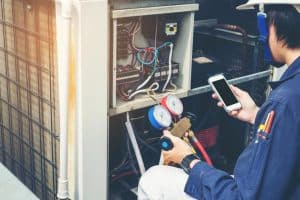Discover Comprehensive A/c Solutions for All Your Heating & Cooling Requirements
In the world of home convenience, the selection of a suitable Cooling and heating system plays a crucial duty. More exploration of these systems discloses the elaborate balance between expense and capability.
Understanding Different Kinds Of Cooling And Heating Equipments
cooling and heating systems, essential for controling indoor environment, differ extensively to match various environments and developing demands. Central systems, one of one of the most usual types, use a network of ducts to disperse conditioned air throughout a building. These systems usually include elements like furnaces, air conditioners, or warm pumps. In contrast, ductless systems, such as split, multi-split, or mini-split systems, offer straight cooling and heating to details areas without the requirement for ductwork, offering more local control and potentially lowering power losses connected with ducting. One more alternative is the progressively popular geothermal heatpump system, which makes use of below ground temperature levels to provide heating & cooling, offering a green alternative that can substantially decrease energy use over time.
Picking the Right HVAC System for Your Home
Selecting the appropriate Heating and cooling system for your home entails careful consideration of numerous elements. The kind of system-- whether a split system, crossbreed, or ductless-- should align with the home's architectural layout and existing ductwork to make sure optimum performance and ease of installation.

The Importance of Normal Cooling And Heating Maintenance
After choosing the appropriate A/c system, preserving its performance and durability comes to be the next action. Routine Cooling and heating maintenance is essential for ensuring that home heating and cooling systems run at peak performance. Normal upkeep is an important component of owning a HVAC system.
Usual Heating And Cooling Troubles and Exactly How to Address Them
Regardless of routine maintenance, Cooling and heating systems can still experience a range of typical concerns that influence their performance and capability. Dirty filters can obstruct airflow, decreasing system effectiveness and straining its parts. An additional regular concern is thermostat malfunctions, which can trigger the A/c system to run excessively or not enough, leading to discomfort and raised power expenses.
Reviewing the Cost-Effectiveness of Cooling And Heating Upgrades
Why should property owners consider upgrading their a/c systems? Upgrading an a/c system can dramatically lower energy consumption, bring about reduced utility costs and boosted energy efficiency. Modern systems are designed to be extra eco-friendly, utilizing less energy to achieve the exact same level of comfort contrasted to older versions. Additionally, newer systems commonly include innovative functions such as programmable thermostats, which can maximize heating and cooling down schedules based upon way of life patterns, additionally improving cost financial savings.
When reviewing the cost-effectiveness of these upgrades, it is residential hvac repair essential to think about the first financial investment against long-lasting financial savings. Normally, the higher ahead of time cost can be countered by the decrease in continuous power expenses and maintenance prices. Furthermore, several neighborhood governments supply discounts and motivations for energy-efficient appliance purchases, making upgrades a lot more inexpensive.

Conclusion
In conclusion, selecting the appropriate Cooling and heating system and guaranteeing routine maintenance are essential for optimum indoor convenience and air top quality. Numerous systems supply customized solutions, making it important to comprehend the details needs based on home size and neighborhood climate.
In contrast, ductless systems, such as split, multi-split, or mini-split systems, give straight air conditioning and heating to certain areas without the demand for ductwork, using even more local control and potentially minimizing energy losses linked with ducting. The type of system-- whether a split system, hybrid, or ductless-- should line up with the home's structural style and existing ductwork to make sure ideal performance and simplicity of installation.
